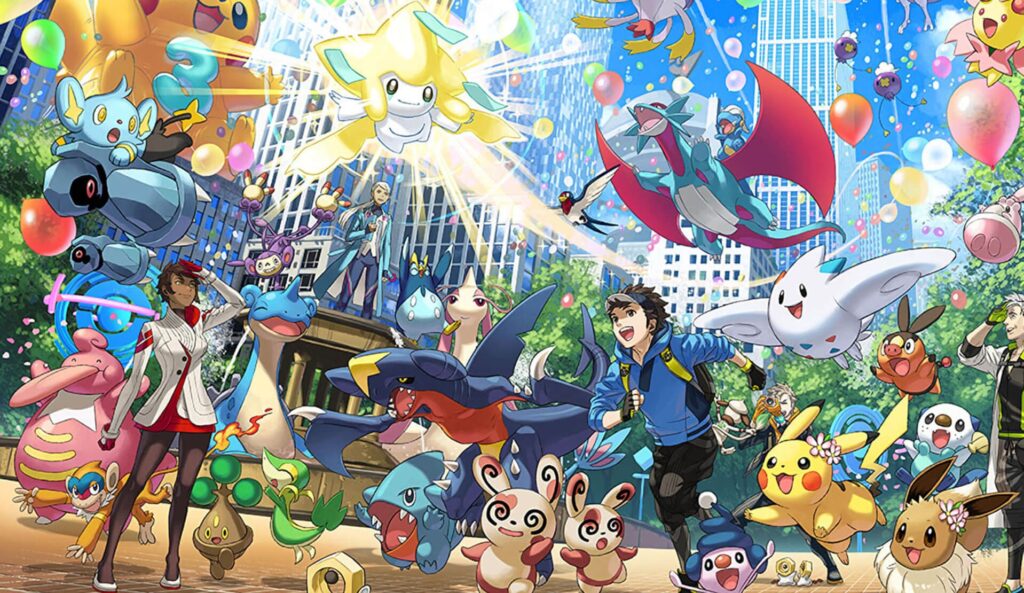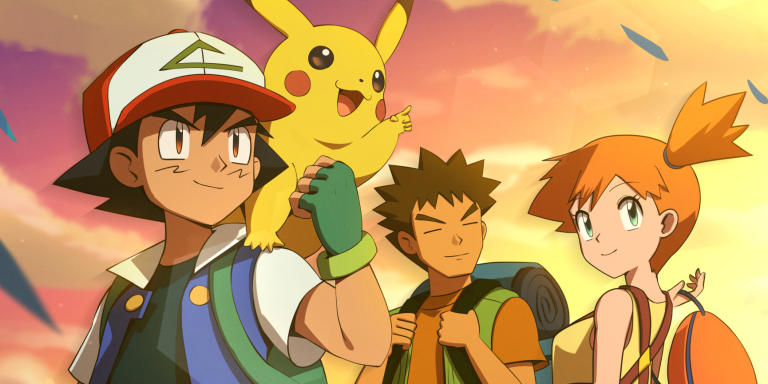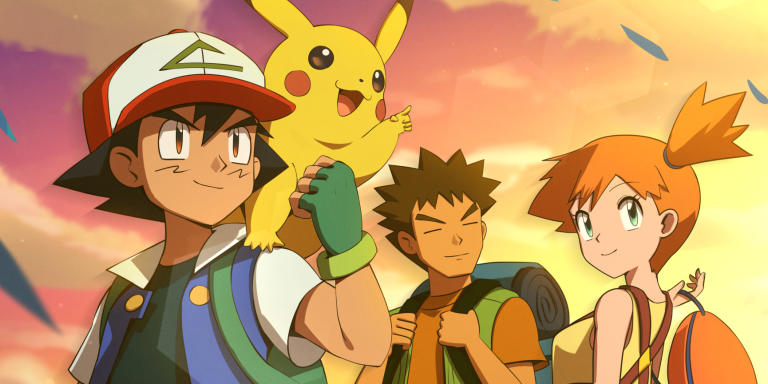
Lorem ipsum dolor sit amet, consectetur adipiscing elit. Ut elit tellus, luctus nec ullamcorper mattis, pulvinar dapibus leo.
 1
Spearow (#21)
Normal|Flying
1
Spearow (#21)
Normal|Flying
 2
Alolan Golem (#76)
Rock|Electric
2
Alolan Golem (#76)
Rock|Electric
 3
Jirachi (#385)
Steel|Psychic
3
Jirachi (#385)
Steel|Psychic
 4
Machamp (#68)
Fighting|
4
Machamp (#68)
Fighting|
 5
Krabby (#98)
Water|
5
Krabby (#98)
Water|
 6
Poipole (#803)
Poison|
6
Poipole (#803)
Poison|
 7
Simisage (#512)
Grass|
7
Simisage (#512)
Grass|
 8
Hawlucha (#701)
Fighting|Flying
8
Hawlucha (#701)
Fighting|Flying

Itching to be the next Pokemon Master? There are tons of things you need to know before you reach that spotlight. Whether you are playing on different game versions competitively, Pokemon gameplay remains consistent. There have been a few tweaks in gameplay such as Mega Evolution, Gigantamax, and Terastalizing, but the base gameplay concept of battle remains the same— that there are Pokemon-type weaknesses and strengths!
Pokemon types are inherent elemental attributes of both the Pokemon and its moves. Pokemon types apply to any Pokemon game, except for non-battle spinoff games such as Pokemon Snap, Pokemon Café ReMix, and a few others. These elemental attributes dictate the weaknesses, strengths, and resistances of a Pokemon against another Pokemon’s move.

In the first generation Pokemon game, there are only 15 Pokemon types. Today, there are already a total of 18 official Pokemon types existing. There are other released Pokemon types that are unofficial and were only released into specific titles. For example, the bird type is supposed to be a Pokemon type for Gen 1 and Gen 2 versions. This was later on scrapped by the developers. There is also a “???” Pokemon type particular to the move Curse. It was also removed after Gen V. The special Shadow-type Pokemon exists only in Pokemon Colosseum, Pokemon XD: Gale of Darkness, and Pokemon Go.
Below is the full table of the 18 Pokemon Types including their corresponding strengths, weaknesses, and resistances. Few notes to consider:
Pokemon Type | Description | Strong Against | Vulnerable Against | Weaker Against | Immune Against |
| Bug | Bug-type Pokemon are based on animals often found in jungles, forests, and grassy areas such as spiders, scorpions, and insects. Bug-type Pokemon are very accessible and abundant. They are considered the easiest Pokemon type to raise and evolve. | Grass Psychic Dark | Flying Rock Fire | Fire Fighting Poison Flying Ghost Steel Fairy | — |
| Dark | Dark-type Pokemon are based on gloomy, dire, or feral traits of animals. Most Pokemon with Dark type use sneaky moves and dirty tactics to take advantage and win battles. | Psychic Ghost | Fighting Bug Fairy | Fighting Dark Fairy | Psychic |
| Dragon | Dragon-type Pokemon are mythical creatures that are said to have existed in ancient times. Dragon Pokemon are often hard to find and catch. They are considered to be the hardest Pokemon type to raise because they evolve at late levels, requiring heavy grinding or exp farming. | Dragon | Ice Dragon Fairy | Steel Fairy (immune) | — |
| Electric | Electric-type Pokemon excel best at controlling the electricity in battle. Most Electric moves deal massive damage and can induce the Paralyzed status effect. Paired with their high speed and high special attack stat, Electric Pokemon are deadly in battle. | Water Flying | Ground | Grass Electric Dragon Ground (immune) | |
| Fairy | The Fairy type is the 18th Pokemon type introduced in Gen IV of Pokemon games. Fairy Pokemon are initially created to nerf the Dragon and Dark type which dominates most of the competitive battle due to their type advantage. Fairy Pokemon are often adorable and elegant looking. Their abilities are often supernatural and magical. | Fighting Dragon Dark | Poison Steel | Fire Poison Steel | Dragon |
| Fighting | Fighting-type Pokemon are hard-hitting melee fighters. They excel with punching and kicking moves and indulge in rigorous mind and body training. Most Fighting Pokemon have immense attack stat, making them deadly hitters in battle. But watch out! They are limited against Pokemons they cannot reach or touch. | Normal Ice Rock Dark Steel | Flying Psychic Fairy | Poison Flying Psychic Bug Fairy Ghost (immune) | — |
| Fire | Fire type is one of the three basic Pokemon types in the game. Fire-type Pokemon excel with using fire moves that can inflict Burn status to opposing Pokemon. Unlike other types, Fire Pokemon are also rare and only have a few specie due to their environment. | Grass Ice Bug Steel | Water Ground Rock | Fire Water Rock Dragon | — |
| Flying | Flying-type Pokemon are conquerors of the skies. They dominate the battle by taking advantage of their flight ability and attacking with wings or beaks. Rayquaza and Gyarados are considered unique because they have the Flying-type as well despite not having wings. | Grass Fighting Bug | Electric Ice Rock | Electric Rock Steel | Ground |
| Ghost | Ghost Pokemon are notable for their use of ominous moves to haunt their enemies. Compare to other types, Ghost Pokemon often have low HP and can be fainted easily. | Psychic Ghost | Ghost Dark | Normal (immune) Dark | Normal Fighting |
| Grass | Grass type is one of the three basic Pokemon types in the game. Grass Pokemon excel with status-inflicting moves such as Poison, Paralyze, and Sleep. Grass types are easily identified for their greenish color and leaves. They also have moves that steal HP. | Water Ground Rock | Fire Ice Poison Flying Bug | Fire Grass Flying Bug Poison Bug Dragon Steel | — |
| Ground | Ground-type Pokemon dominate the battlefield by controlling the land itself. They live in mountainous regions, deserts, or caves, avoiding watery and cold areas. Ground-type Pokemon are immune to Electric-type moves, making them a relevant Electric Pokemon counter. | Fire Electric Poison Rock Steel | Water Grass Ice | Grass Bug Flying (immune) | Electric |
| Ice | Ice-type Pokemon are considered the least in numbers in the entire game and series. There are only about 60 Ice-type Pokemon created. Ice Pokemon excel in inflicting the Frozen status, making the opposing Pokemon susceptible to more Ice moves and unable to perform any actions. | Grass Ground Flying Dragon | Fire Fighting Rock Steel | Fire Water Ice Steel | — |
| Normal | Normal-type Pokemon is the second most common Pokemon type in the game. There are 115 known Normal Pokemon and they are often the first to be encountered when starting your game. Normal-type moves do not have any advantage against any Pokemon type and their only nemesis is the Fighting type. | — | Fighting | Rock Steel Ghost (immune) | Ghost |
| Poison | Poison-type Pokemon are inspired by poisonous animals like snakes and frogs. In Pokemon games, Poison-type Pokemon are associated with environmental pollution and toxins. They can inflict the Poisoned status which deals damage every turn. | Grass Fairy | Ground Psychic | Poison Ground Rock Ghost Steel (immune) | — |
| Psychic | Psychic-type Pokemon are masters of the mind. They utilize telekinesis and mind powers to inflict damage against opposing Pokemon. Among all other types, Psychic Pokemon tend to have higher Sp.Atk stat but low Atk stat. | Fighting Poison | Bug Ghost Dark | Psychic Steel Dark (immune) | — |
| Rock | Rock types are known for their high Def stat, making them tanky against physical moves. Rock types are iconic for their rocky looks. They are often found in caves, mountains, and deserts together with Ground Pokemon. Rock types have the most weakness in the entire game. | Fire Ice Flying Bug | Water Grass Fighting Ground Steel | Fighting Ground Steel | — |
| Steel | Steel-type Pokemon have high Def stats similar to Rock types. But unlike Rock types, Steel Pokemon are more versatile as they have a wider variety of Steel-type moves and higher Atk stat. Steel types, however, have very low Spd stat due to their heavy bodies. | Ice Rock Fairy | Fire Fighting Ground | Fire Water Electric Steel | Poison |
| Water | Water type is one of the three basic Pokemon types in the game. They are considered the most common Pokemon type in the game with 144 known species. Water-type Pokemon represent most aquatic animals that live in any form of water. | Fire Ground Rock | Grass Electric | Water Grass Dragon | — |
The Ice type is considered the rarest type of Pokemon. Of the current 1008 Pokemons today, there are only 58 Ice-type Pokemon in it. This comprises only 5.75% of all Pokemon and is a very small number compared to other types. This is followed by the Fairy type with only 68 species or 6.7% of all Pokemon, and the Dragon type with only 70 known species, or 6.9% of all Pokemon.

Water-type Pokemon, on the other hand, are the most abundant. Water Pokemon comprise 15.57% of all Pokemon, having 158 known species of it. This is followed by the Normal type with 132 known Pokemon or 13% of all Pokemon. But disregarding secondary types and other forms, the most common type will be the pure Normal type with 101 known Pokemon followed by the pure Water type with only 57 Pokemon. Normal-type moves are the most abundant, with a total of 167 moves.
“Learn about the 18 official Pokemon types, their strengths, and weaknesses, as well as interesting facts about Pikachu’s design and popularity. ”
You are probably thinking that Pikachu is the most popular Pokemon, but you guessed it wrong. While Pikachu is indeed an iconic character of the Pokemon franchise, the widely accepted most popular Pokemon is Charizard. According to analytics, Charizard is the most searched Pokemon with an average of 240,000 searches per month. This is mainly due to the Pokemon game wherein players try to search for ways how they can make use of their Charizard competitively.
But this doesn’t mean that Pikachu is no longer popular. Pikachu does not seem to be a competitive Pokemon in any of the released games of Game Freak. Let’s talk about Pikachu and why it became an icon of the Pokemon franchise in the first place.
Pikachu is the most well-known Pokemon species. We’ve known Pikachu since the start of the first Pokemon episode where it was chosen as a starter Pokemon of Ash Ketchum. Since then, Pikachu dominated the spotlight and became the promotional icon of the entire Pokemon franchise. Every time we see a Pokemon, we know that there will be a Pikachu drawing next to it.
But how much do you know about this adorable electric mouse? Let’s find out some of the fun facts about our beloved Pikachu.
Game Freak first developed Pokemon Red and Blue in Japan, in 1996. After the first release by Nintendo, Pikachu was used as a promotional image for the new game. The woman behind the design of Pikachu is none other than Atsuko Nishida. Atsuko Nishida was initially working on the designs of characters for the game Pulseman before the Pokemon project. In her first drawings, she drew Pokemon as scary characters because the creatures are intended to be “monsters” in the first place—thus the term Pocket + Monster.
She then revised her works because scary characters might give a wrong impression to the audience. She revised her initial designs and changed them with adorable characters. This led to the creation of the initial designs of Pikachu and other Pokemon.
The first draft of Pikachu is based on daifuku, a sweet Japanese dessert. But she scrapped the idea and instead based the design on a squirrel. It was also in the squirrels that she found inspiration for the electric cheeks because squirrels store food on their cheeks. After proposing the drafts, a final touch on Pikachu was made by Satoshi Tajiri, one of the creators of Pokemon, who changed Pikachu into a mouse. The first drafted designs of Pikachu included Raichu and a third evolution which was scrapped after the release.

The name “Pikachu” was derived from the combination of two Japanese onomatopoeia “pikapika”, referring to sparks or electrical sounds, and the word “chuchu”, the sound of mice. In the anime series, Ash never renamed Pikachu with other names. The same with his other Pokemon, calling them by their specie names instead of nicknames. However, in the manga series The Electric Tale of Pikachu, Ash renamed his Pikachu Jean Luc Pikachu. This can be read in the third chapter of the manga series. The name “Jean Luc Pikachu” is a direct reference to Hollywood actor Jean Luc Picard. Although this was meant to be a joke on the part of the Pokemon Company, they want us to forget about this embarrassment… entirely!
There are many reasons why Pikachu is well-loved, not only in Japan but in every part of the world. In 1999, Pikachu is regarded as the “most loved character since Hello Kitty”. This statement was made through an article in Time Magazine, and a lot of critics and fans both agreed with this verdict. Because of the new game concept Pokemon introduces, it spread like wildfire across Western countries and Asian neighbors of Japan. Pikachu rapidly become more popular, which eventually lead The Pokemon Company to use it as their main figure and icon in all of their promotions.
The Japanese, on the other hand, greatly regarded Pikachu as a direct equivalent of the famous Mickey Mouse character. With its cute design and colors, Pikachu became the greatest character of all time since its creation.